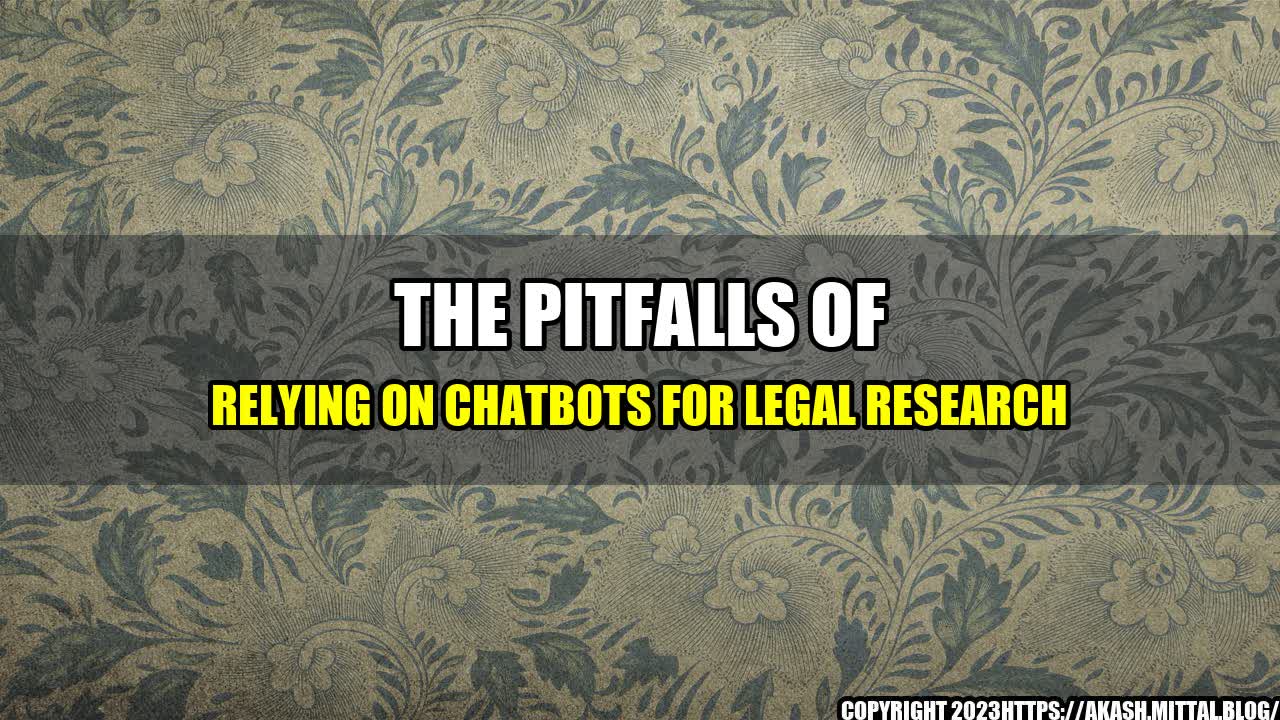
Once upon a time, a young Jane, a US lawyer, who worked for a prestigious law firm, got a new case that required extensive legal research. Since the case had a deadline, she decided to use ChatGPT, a legal research bot for her research. She fed it with all the information she had and waited for it to generate the results she needed. She read through the results and was satisfied with what she saw, so she went ahead and formulated her legal brief based on the research provided by the bot.
Days later, she presented her legal brief to her bosses, the judge, and the jury. To her surprise, evidence from the cases she cited either had been overruled or were nonexistent. Her case plan fell apart since the research she'd depended on proved to be flawed. Her legal brief became worthless and she had to start her research again from scratch.
This story shows how lawyers relying on Chatbots' results can produce fake legal cases that can jeopardize their cases. While AI Chatbots provide a considerable time-saving solution for legal research, lawyers must be aware of the potential pitfalls and ensure they double-check the generated results.
The Risks of Chatbots in Legal Research
The following are quantifiable risks that suggest lawyers should not rely on Chatbots solely for their legal research.
1. Incomplete Information
Chatbots require additional information not only about the case but also about certain laws and its principles to make accurate conclusions. If the bot doesn't have enough information, it may generate incomplete or incorrect data, leading to a case's collapse.
Example: Imagine researching a case with only a few variables set on Chatbots. The bot produced the results based on the few variables supplied, and as such, the observance or consideration of other vital evidence goes un-noticed and not considered, thereby leading to incomplete case research.
2. Unvetted Sources
Chatbots, from time to time, fetch research data from sources that are biased or unvetted. This can be a serious issue because for a case to stand, the evidence presented must be valid and from credible sources.
Example: If Chatbots accidentally grab data from social media, it can lead to a case's downfall, especially if the source of such data can be traced to be biased or influenced negatively.
3. Lack of Human Insights
While AI Chatbots are intelligent and can generate accurate results, they lack the emotional and critical thinking that only comes from human insights. Humans can read between the lines of a case and unravel some of the hidden reasons behind certain actions, and with AI, it's not entirely feasible.
Example: A Chatbot generating research on the cause of a negative action may never be able to understand the context behind the motive or actions that led to the negative action.
How to Prevent Legal Research Mistakes due to Chatbots?
It's essential to remember that Chatbots are only meant to be a helpful tool, not an all-around solution. As such, lawyers can take the following steps to prevent chatbot-based legal research mistakes.
1. Research in-depth
It's essential first to research thoroughly on the case at hand before using AI Chatbots. The information already attained will help the chatbot fetch more accurate data to support the case information.
2. Cross-Check Chatbot Results with other sources
After finding the results from the chatbot, it's essential to cross-check and authenticate those results with reputable sources. That way, any negative implications of that report getting generated inaccurately will not affect the case underway.
3. Involve experts initially
It's important to involve experts and other lawyers within the same niche area to gain insights and recommendations before using AI Chatbots. This step provides a more in-depth understanding of the case and helps generate more appropriate questions that will help the chatbot's research.
Conclusion
In conclusion, the use of AI chatbots provides helpful tools for quick and easy legal research. However, it's essential to acknowledge the risks involved when relying solely on chatbots for legal research. Lawyers must ensure to recheck and confirm any generated information. Moreover, involving human insights like the oversight of legal experts provides the much-needed mental and emotional clarity in assessing cases.
Reference Links and Hashtags:
Legal AI and Chatbots: www.lexology.com/library/detail.aspx?g=3914bc20-4bc5-4a04-ba51-4ae283caaa0c
Legal chatbot services: www.botpress.com/solutions/legal-chatbot/
#legalAI #legaltech #lawfirmmarketing #lawtech #AIresearch #chatbots at Legal Tech conferences
Article Category: Legal Research & Development
Curated by Team Akash.Mittal.Blog
Share on Twitter Share on LinkedIn